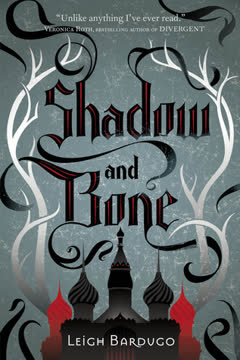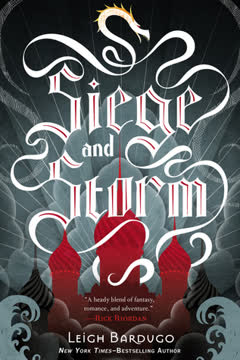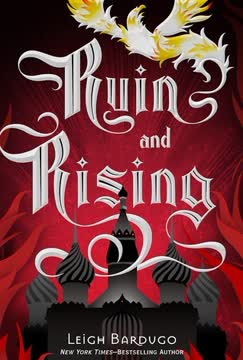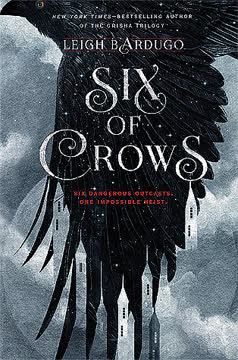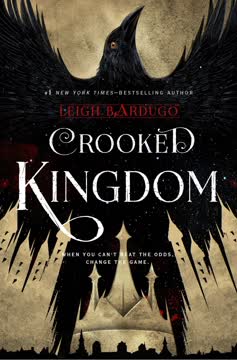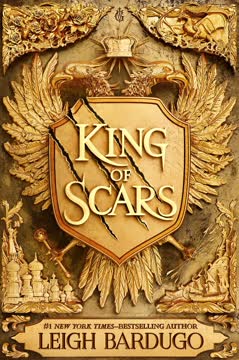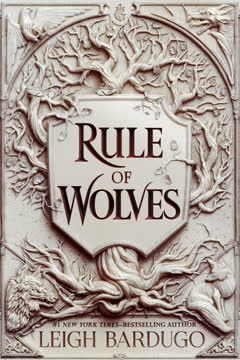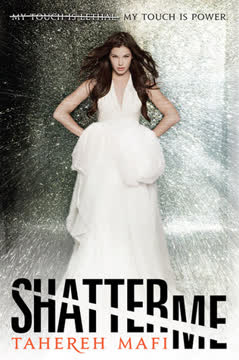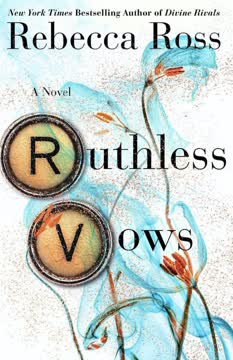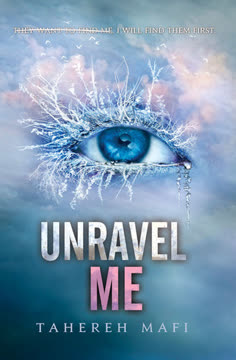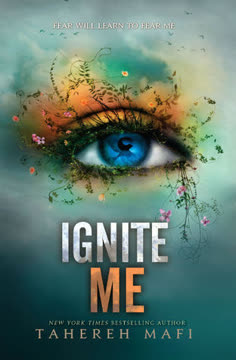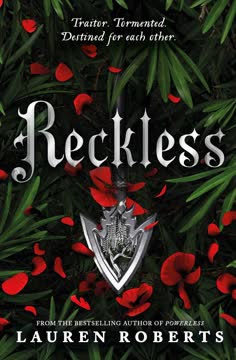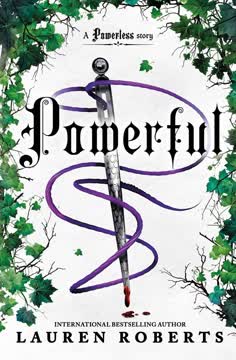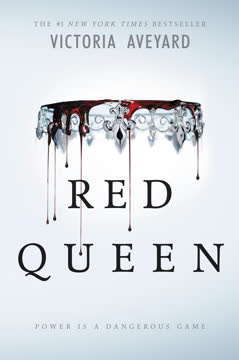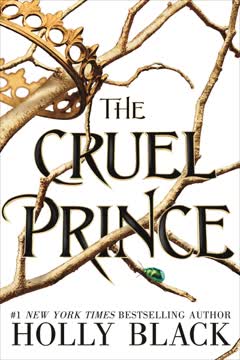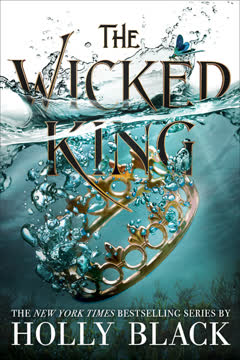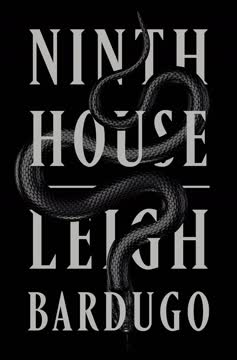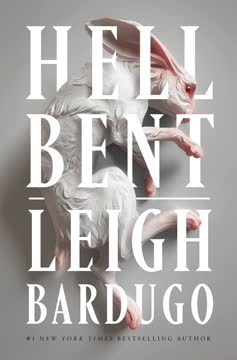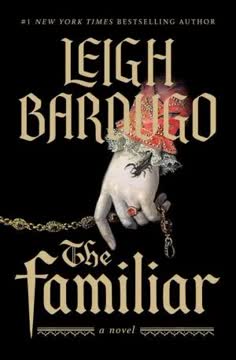Plot Summary
Orphans in the Shadows
Alina Starkov and Malyen Oretsev, war orphans, grow up together in the Duke's estate, clinging to each other for comfort and survival. Their bond is forged in loneliness and adversity, making them inseparable. When Grisha Examiners visit, Alina subconsciously suppresses her latent magical power to avoid being separated from Mal, setting the stage for her lifelong struggle with her identity. Their childhood is marked by dreams of a simple life, but the world's violence and their own differences foreshadow a destiny neither can escape.
Into the Unsea
As young adults, Alina and Mal serve in Ravka's First Army, tasked with crossing the Shadow Fold—a swath of impenetrable darkness teeming with monsters called volcra. During a disastrous attack, Mal is gravely wounded, and Alina, desperate to save him, unleashes a blinding surge of light that repels the volcra. This unprecedented display reveals her as a Sun Summoner, a legendary Grisha with the power to summon sunlight, and changes her fate forever.
Power Unleashed
Alina's miraculous act draws the attention of the Darkling, the enigmatic and powerful leader of the Grisha. She is taken from Mal and thrust into the world of the Grisha elite, where her abilities are tested and confirmed. The Darkling believes Alina is the key to destroying the Shadow Fold and uniting Ravka. Alina, overwhelmed and isolated, struggles to understand her power and her place in this new world, while Mal is left behind, wounded and confused.
The Darkling's Grasp
Alina is transported under heavy guard to the Little Palace, the Grisha's training ground, where she is both revered and resented. The Darkling becomes her protector and mentor, but his motives are ambiguous. Alina is subjected to rigorous training, court intrigue, and the manipulations of those who see her as a tool or a threat. She is both dazzled and unsettled by the Darkling's charisma, and her longing for Mal intensifies her sense of alienation.
A New World of Power
At the Little Palace, Alina undergoes a physical and emotional transformation. She is made beautiful by Genya, a Grisha Tailor, and is introduced to the opulence and hierarchy of Grisha society. Despite her new status, Alina feels like an outsider, unable to summon her power at will and haunted by her separation from Mal. The Darkling's attention both flatters and unnerves her, and she is drawn into the dangerous politics of the royal court.
Lessons in Light and Pain
Alina's days are filled with brutal training under Baghra, a mysterious and harsh Grisha teacher, and Botkin, a mercenary combat instructor. She faces jealousy and sabotage from other Grisha, especially the powerful Squaller Zoya. Alina's inability to control her power leads to frustration and self-doubt. She is isolated by her uniqueness and the expectations placed upon her, and her health deteriorates as she unconsciously suppresses her abilities.
Court Intrigues and Rivalries
Alina is paraded before the King and Queen, dazzling the court with her power under the Darkling's guidance. She becomes a symbol of hope and a pawn in political games. Rivalries with other Grisha intensify, and rumors swirl about her relationship with the Darkling. The Apparat, a sinister priest, warns her of the dangers of faith and power. Alina's longing for Mal and her discomfort with her role grow, even as she is drawn deeper into the Darkling's orbit.
The Truth of Power
Haunted by memories and her longing for Mal, Alina finally confronts the root of her weakness: her refusal to accept her power for fear of losing Mal. In a moment of clarity, she lets go of her past and fully embraces her identity as the Sun Summoner. Her power surges, transforming her physically and emotionally. She becomes stronger, healthier, and more confident, finally able to summon light at will and take her place among the Grisha.
The Stag's Mercy
The Darkling seeks Morozova's stag, a mythical creature whose antlers can amplify a Grisha's power. Alina and Mal, reunited after a harrowing escape, race to find the stag before the Darkling. When they finally encounter the creature, Alina cannot bring herself to kill it, choosing mercy as power over power. The Darkling arrives, kills the stag, and has its antlers fashioned into a collar for Alina, binding her power to his will.
Betrayal and Escape
Baghra, revealed as the Darkling's mother, exposes his true plan: to use Alina and the Fold as weapons of conquest, not salvation. She helps Alina escape the Little Palace, urging her to flee Ravka. Alina and Mal become fugitives, hunted across the country by the Darkling's forces. Their journey is fraught with danger, deprivation, and the constant threat of capture, but their bond deepens as they rely on each other for survival.
Hunted Across Ravka
Alina and Mal traverse forests, mountains, and villages, evading the Darkling's soldiers and struggling to stay alive. Along the way, they confront their feelings for each other, confessing their love and regrets. Mal's extraordinary tracking skills and Alina's growing mastery of her power keep them one step ahead, but the weight of their choices and the cost of mercy haunt them both.
Reunion and Resolve
Despite their efforts, the Darkling captures Alina and Mal after they find the stag. He binds Alina with the collar, making her power his own, and prepares to demonstrate his might by expanding the Fold and destroying a city. Alina is forced to watch, powerless, as the Darkling unleashes darkness and death. The horror of her complicity and the threat to Mal force her to confront the true nature of her power and the meaning of sacrifice.
The Price of Mercy
In the moment of greatest despair, Alina realizes that by sparing the stag, she claimed its power through mercy, not violence. This insight breaks the Darkling's hold over her, restoring her agency and control. She seizes her power, defies the Darkling, and uses her light to save Mal and herself, shattering the skiff and leaving the Darkling to the mercy of the volcra. Alina and Mal escape the Fold, forever changed by what they have done and what they have lost.
The Darkling's Triumph
The Darkling's vision of a world ruled by fear and darkness is revealed in full. He manipulates politics, eliminates rivals, and uses the Fold as a weapon to subjugate nations. His charisma and ruthlessness inspire both loyalty and terror. The Grisha, the court, and the people of Ravka are caught between hope and dread, uncertain whether Alina is a savior or a harbinger of doom.
The Fold Unleashed
The Darkling's demonstration of power devastates Novokribirsk, killing innocents and proving his willingness to destroy for control. Alina, forced to participate, is wracked with guilt and horror. The world witnesses the birth of a new age of darkness, and the true cost of unchecked ambition and power is laid bare. Alina's struggle becomes not just for her own freedom, but for the soul of Ravka itself.
A Choice in Darkness
Faced with the Darkling's ultimatum and Mal's impending death, Alina makes a desperate choice. She claims her power, not through domination, but through compassion and self-acceptance. She breaks the Darkling's control, saves Mal, and rejects the path of tyranny. Her decision marks a turning point, offering a glimmer of hope in a world overshadowed by fear.
Breaking the Chain
Alina and Mal flee across the Fold and into West Ravka, pursued by the memory of those they could not save and the knowledge that the Darkling may have survived. They burn the last remnants of their old lives, choosing anonymity and exile over power and glory. Their love, forged in suffering and sacrifice, becomes their only refuge as they seek a new beginning.
Freedom Across the Sea
Alina and Mal, fugitives and survivors, secure passage on a ship bound for an uncertain future. They are ghosts, marked by what they have endured and what they have done. The world they left behind is changed forever, and the threat of the Darkling's return looms. Yet, in each other, they find hope, healing, and the possibility of redemption, even as they watch the horizon for the shadows that may yet follow.
Characters
Alina Starkov
Alina is a war orphan whose sense of not belonging shapes her entire life. Her deep attachment to Mal is both her strength and her weakness, leading her to suppress her own power for fear of losing him. Thrust into the world of the Grisha, she is torn between longing for acceptance and fear of her own uniqueness. Alina's journey is one of self-discovery, as she learns to embrace her power, confronts the seductive allure of the Darkling, and ultimately chooses compassion over ambition. Her psychological arc is defined by her struggle with identity, loneliness, and the cost of mercy.
Malyen "Mal" Oretsev
Mal is Alina's childhood companion and emotional anchor. His natural charisma and skill as a tracker make him a leader among his peers, but he is haunted by loss and survivor's guilt. Mal's journey mirrors Alina's: he must confront his own feelings of inadequacy and jealousy, and ultimately risk everything to save her. His love for Alina is steadfast, but he is also forced to reckon with the ways they have changed and the sacrifices required by their bond.
The Darkling
The Darkling is the enigmatic and powerful leader of the Grisha, whose vision for Ravka is both seductive and terrifying. He is a master of manipulation, using charm, fear, and calculated vulnerability to control those around him. His true nature is revealed as the Black Heretic, the creator of the Shadow Fold, whose hunger for power knows no bounds. The Darkling's psychological complexity lies in his loneliness, his belief in his own righteousness, and his inability to understand mercy or love except as tools for control.
Genya Safin
Genya is a Grisha who exists on the margins of both court and Grisha society, valued for her beauty and skill but used as a pawn by those in power. Her friendship with Alina is genuine but complicated by her own ambitions and traumas. Genya's choices reflect the compromises required to survive in a world where power is everything, and her arc is one of both complicity and regret.
Baghra
Baghra is Alina's brutal instructor, pushing her to embrace her power through pain and humiliation. Her true identity as the Darkling's mother and her role in his creation add layers of guilt and sorrow to her character. Baghra's actions are driven by a desperate desire to prevent her son's descent into monstrosity, even at the cost of betraying him. She embodies the theme of tough love and the burden of responsibility for one's creations.
Ivan
Ivan is a Heartrender fiercely loyal to the Darkling, representing the unquestioning obedience and brutality of the Grisha elite. He is both a gatekeeper and a symbol of the dangers of power without conscience, serving as a constant threat to Alina and Mal.
The Apparat
The Apparat is a shadowy figure who wields religious influence and preys on the fears and hopes of the people. He recognizes the power of myth and faith, warning Alina of the dangers of becoming a living Saint. His true motives are ambiguous, and he represents the intersection of politics, religion, and manipulation.
Zoya Nazyalensky
Zoya is a talented and beautiful Grisha who resents Alina's sudden rise and unique power. Her rivalry with Alina exposes the toxic competitiveness and fragility of Grisha society, as well as the dangers of envy and exclusion.
David Kostyk
David is a genius craftsman whose skills are exploited by the Darkling to create the collar that binds Alina. His guilt and regret highlight the moral ambiguities faced by those who serve power, and his relationship with Genya adds emotional depth to his character.
Marie and Nadia
Marie and Nadia are Alina's peers, offering both camaraderie and a mirror to her own struggles with belonging and ambition. Their shifting loyalties and reactions to Alina's rise and fall illustrate the complexities of friendship, envy, and survival within the Grisha hierarchy.
Plot Devices
The Shadow Fold
The Shadow Fold, or Unsea, is a swath of darkness filled with monsters, created by the Darkling's ancestor. It serves as both a physical obstacle and a symbol of the darkness within power and ambition. The Fold's existence drives the plot, shaping the destinies of nations and individuals, and its expansion or destruction becomes the central conflict.
Amplification and the Stag
The quest for Morozova's stag and its antlers as an amplifier is a classic fantasy device, representing the temptation of ultimate power and the moral choices that come with it. The rules of amplification—power claimed through killing—are subverted by Alina's act of mercy, which becomes the key to her freedom. This device explores the relationship between violence, compassion, and true strength.
The Chosen One and the Outsider
Alina's arc follows the "chosen one" trope but complicates it with her deep sense of alienation, self-doubt, and the psychological cost of being different. Her journey is as much about accepting herself as it is about saving the world, and her power is tied to her willingness to let go of the past and embrace her true self.
Manipulation and Betrayal
The narrative is structured around layers of manipulation—by the Darkling, Baghra, Genya, and even Alina herself. Betrayals are foreshadowed through subtle clues, and the shifting loyalties of characters create a sense of instability and suspense. The use of unreliable mentors and the revelation of hidden motives drive the plot's twists and deepen the psychological complexity.
Mercy as Power
The central plot device is the idea that true power comes not from domination or violence, but from mercy and self-acceptance. Alina's refusal to kill the stag, and her realization that this act gives her control over her power, subverts the traditional fantasy narrative and offers a radical redefinition of strength.
Analysis
Shadow and Bone is a dark, psychologically rich fantasy that interrogates the nature of power, identity, and belonging. Leigh Bardugo crafts a world where magic is both a gift and a curse, and where the lines between heroism and villainy are blurred by ambition, trauma, and the longing for connection. The novel's central lesson is that true strength lies not in domination or violence, but in compassion, self-acceptance, and the courage to choose mercy even when it comes at great personal cost. Alina's journey from orphaned outsider to empowered Sun Summoner is both a thrilling adventure and a meditation on the price of love, the seduction of power, and the possibility of redemption. In a world obsessed with hierarchy and control, Shadow and Bone reminds us that the most transformative acts are those of kindness, and that the greatest battles are fought within the self.
Last updated:
FAQ
```markdown
0. Synopsis & Basic Details
What is Shadow and Bone about?
- Orphan's Hidden Destiny: Shadow and Bone introduces Alina Starkov, a seemingly ordinary orphan and cartographer in the war-torn kingdom of Ravka, whose life is irrevocably altered when she discovers she possesses a legendary power: the ability to summon light. This revelation occurs during a perilous crossing of the Shadow Fold, a monstrous expanse of darkness that has severed Ravka from its coast.
- Grisha World Unveiled: Alina is whisked away from her only friend, Mal, and thrust into the opulent and dangerous world of the Grisha, Ravka's magical elite, led by the enigmatic and powerful Darkling. She is believed to be the Sun Summoner, a fabled figure prophesied to destroy the Shadow Fold and save Ravka.
- Power, Politics, & Peril: As Alina navigates rigorous training, court intrigues, and the seductive allure of the Darkling, she grapples with her newfound identity, the true nature of her power, and the devastating secrets surrounding the Shadow Fold and its creator. Her journey becomes a desperate fight for survival, freedom, and the fate of her fractured nation.
Why should I read Shadow and Bone?
- Rich World-Building: Immerse yourself in a unique, Russian-inspired fantasy world, Ravka, with its distinct culture, military, and a magic system ("Small Science") that feels both grounded and wondrous. The detailed descriptions of the Little Palace, the Shadow Fold, and the various Grisha orders create a vivid and immersive experience.
- Complex Character Dynamics: Explore the intricate relationships between Alina, her childhood friend Mal, and the charismatic Darkling, a triangle fraught with longing, manipulation, and shifting loyalties. The novel delves into themes of identity, belonging, and the corrupting nature of power through its deeply flawed and compelling characters.
- Subversive Fantasy Tropes: Leigh Bardugo masterfully employs and subverts classic "chosen one" and "dark lord" tropes, offering a fresh perspective on heroism, villainy, and the true meaning of strength. The narrative challenges readers to question appearances and motivations, leading to unexpected twists and a thought-provoking conclusion.
What is the background of Shadow and Bone?
- Ravka's Divided Landscape: The story is set in Ravka, a kingdom geographically and politically fractured by the Shadow Fold, a vast, monster-infested darkness that cuts off its western coast and vital trade routes. This isolation fuels internal strife and makes Ravka vulnerable to its hostile neighbors, Fjerda to the north and Shu Han to the south.
- Grisha and First Army Divide: Ravka's society is divided between the ordinary First Army, responsible for defense, and the Grisha, practitioners of the "Small Science" (magic) who form the elite Second Army. Despite their power, Grisha are often feared and mistrusted by the common people, creating a societal tension that the Darkling seeks to exploit.
- Historical & Mythological Echoes: The world draws heavily from Imperial Russia, evident in its names (Starkov, Oretsev, Tsibeya), architecture (onion domes, grand palaces), and cultural elements (kvas, banya, Saints). The Shadow Fold itself is rooted in a dark historical event, the creation by the Black Heretic, a figure whose legacy looms over the present.
What are the most memorable quotes in Shadow and Bone?
- "The problem with wanting," he whispered, his mouth trailing along my jaw until it hovered over my lips, "is that it makes us weak.": This quote, spoken by the Darkling to Alina (Chapter 14), encapsulates his philosophy on desire and control, foreshadowing his manipulative nature and the emotional vulnerability he exploits in Alina. It highlights the central theme of power versus weakness, and the dangers of emotional attachment.
- "I'm sorry I left you so long in the dark. I'm sorry, but I'm ready now.": Alina's internal monologue (Chapter 12) as she finally embraces her Sun Summoner power, directly addressing the suppressed part of herself. This quote marks her pivotal emotional turning point, symbolizing her acceptance of her true identity and her liberation from the fear of abandonment that had held her back.
- "Mercy was something the Darkling would never understand.": Alina's realization (Chapter 22) during the climax, as she understands the true source of her amplified power. This line defines the fundamental difference between her and the Darkling, establishing mercy as power and compassion as her unique strength, directly contrasting his ruthless ambition and control.
What writing style, narrative choices, and literary techniques does Leigh Bardugo use?
- First-Person Introspection: Bardugo employs a first-person narrative from Alina's perspective, immersing readers directly in her thoughts, fears, and evolving perceptions. This choice allows for deep psychological exploration, particularly Alina's internal struggles with self-worth, identity, and her conflicted feelings for both Mal and the Darkling.
- Sensory-Rich Prose: The writing is highly descriptive, appealing to all five senses to build a vivid and atmospheric world. From the "green and gold smells of the autumn wood" (Chapter 1) to the "musty robes" and "damp smell of tombs" of the Apparat (Chapter 10), Bardugo creates a tangible sense of place and character.
- Pacing and Suspense: The narrative maintains a brisk pace, punctuated by moments of intense action and quiet introspection. Bardugo uses foreshadowing, dramatic reveals (like Baghra's true identity), and cliffhanger chapter endings to build suspense and keep the reader engaged, particularly evident in the perilous journey through the Fold and Alina's escape.
1. Hidden Details & Subtle Connections
What are some minor details that add significant meaning?
- Alina's Scar as a Symbol: Alina's self-inflicted scar on her palm, acquired from a broken cup (Chapter 21), is a subtle but potent symbol of her childhood trauma and her deep-seated fear of abandonment. Mal kissing this scar in the cell (Chapter 21) signifies his acceptance of her past and the healing of their bond, transforming a mark of pain into one of enduring love.
- The Duke's Estate as a Microcosm: The Duke's estate, where Alina and Mal grew up, is initially presented as a charitable haven, but Ana Kuya's harshness and the older children's bullying (Before) hint at the pervasive social hierarchies and cruelty that exist even in seemingly benevolent environments, mirroring the larger power dynamics of Ravka. The "malenchki, little ghosts" nickname foreshadows their later fugitive status.
- Grisha Kefta Colors and Social Hierarchy: The specific colors of the Grisha kefta (blue for Summoners, red for Corporalki, purple for Fabrikators) and their embroidery (silver for Squallers, red for Inferni) are not just aesthetic choices but a rigid visual code of power and status. Genya's white and gold kefta, signifying her role as the Queen's Tailor, subtly marks her as an outsider and a servant, despite her Grisha abilities, highlighting the court's disdain for her unique craft.
What are some subtle foreshadowing and callbacks?
- Baghra's Early Contempt: Baghra's initial, almost personal, disdain for Alina's inability to summon light ("What am I supposed to do with a girl who can't call her own power?" - Chapter 9) subtly foreshadows her later revelation as the Darkling's mother. Her frustration isn't just a teacher's, but a mother's desperate attempt to force Alina to confront the power that could save (or doom) her son.
- The Darkling's "Living Amplifier": The Darkling's casual explanation that he is a "living amplifier" (Chapter 4) and that his bones or teeth would make another Grisha powerful, initially seems like a boast. However, it subtly foreshadows his ultimate plan to bind Alina's power to his, revealing his true nature as a parasitic force that consumes others' strength for his own.
- "Like calls to like": This fundamental principle of the Small Science is repeated throughout the book (e.g., Chapter 13). While initially referring to Grisha affinities, it subtly foreshadows Alina's ultimate realization that her power is amplified by her mercy (like calls to like), directly contrasting the Darkling's belief that power is claimed through violence and domination.
What are some unexpected character connections?
- Genya and David's Unlikely Romance: The brilliant but socially awkward Fabrikator, David, and the beautiful, court-savvy Tailor, Genya, form an unexpected connection. Genya's confession that David is "actually quite funny when he lets himself be" and her observation that he's "not interested" unless you're "made of metal or glass" (Chapter 13) reveals a deeper, more vulnerable side to her, suggesting that her attraction is to his intellect and genuine nature, contrasting the superficiality of court.
- The Apparat's Ambiguous Warnings: The Apparat, initially presented as a sinister religious figure, offers Alina cryptic warnings about faith and suffering ("You are becoming dangerous, and you will become more dangerous still." - Chapter 10). While his motives remain unclear, his words hint at a deeper understanding of the political and spiritual power dynamics at play, suggesting he might be an unexpected, albeit self-serving, ally against the Darkling's absolute control.
- Botkin's Unconventional Mentorship: Botkin, the gruff Shu Han mercenary, forms an unexpected bond with Alina. His teaching style, focused on practical combat and self-reliance ("Steel is earned." - Chapter 13), contrasts sharply with the Grisha's reliance on innate power. His approval, though rare, is deeply meaningful to Alina, highlighting a connection based on earned skill and resilience rather than inherent magical talent.
Who are the most significant supporting characters?
- Baghra: The Catalyst of Truth: Beyond her role as Alina's harsh mentor and the Darkling's mother, Baghra serves as the primary catalyst for Alina's understanding of the Darkling's true nature and the Fold's origins. Her desperate act of revealing the truth ("He is the Black Heretic." - Chapter 15) forces Alina to confront uncomfortable realities and choose a path of resistance, fundamentally altering the narrative's direction.
- Genya Safin: The Mirror of Compromise: Genya is more than just a friend or a Tailor; she embodies the compromises and hidden suffering within the Grisha hierarchy. Her beauty and skill are exploited by the Queen, and her later alliance with the Darkling (wearing Corporalki red, implying her role in the King's illness - Chapter 20) highlights the difficult choices individuals make for survival and status, reflecting Alina's own temptations and fears of complicity.
- The Apparat: The Prophet of Power Dynamics: The Apparat, while seemingly a minor character, represents the pervasive influence of faith and superstition in Ravka, and how it can be manipulated. His warnings to Alina about becoming a "Saint" and his cryptic pronouncements ("Faith... Something strong enough to topple kings, and even Darklings." - Chapter 10) underscore the idea that power exists beyond magic and military might, hinting at a spiritual battle for Ravka's soul.
2. Psychological, Emotional, & Relational Analysis
What are some unspoken motivations of the characters?
- Alina's Fear of Ordinariness: Alina's deep-seated insecurity and fear of being "nothing special" (Chapter 1) subtly drive her initial suppression of her power and later her desire to please the Darkling. Her longing to belong and be seen as valuable, rather than just "scrawny" or "plain," makes her susceptible to the Darkling's attention and promises of greatness.
- The Darkling's Quest for Absolute Control: Beyond his stated goal of destroying the Fold, the Darkling's true, unspoken motivation is a profound loneliness and a desire for absolute control stemming from his ancient existence and unique power. He seeks not just to unite Ravka, but to remake the world in his image, where he is the unchallenged authority, driven by centuries of being an outsider and a target.
- Mal's Guilt and Self-Sacrifice: Mal's relentless pursuit of the stag and his later decision to follow Alina, even at the cost of desertion and treason, is driven by an unspoken guilt over his perceived inaction when Alina was taken by the Darkling ("I stood there and let him take you." - Chapter 18). His self-sacrificing actions are a desperate attempt to atone and prove his worth to Alina and himself.
What psychological complexities do the characters exhibit?
- Alina's Identity Diffusion: Alina struggles with a fragmented sense of self, oscillating between her "scrawny" orphan identity and the powerful Sun Summoner. Her physical transformation by Genya and her internal battle to accept her power ("I'm sorry I left you so long in the dark." - Chapter 12) highlight her journey to integrate these disparate identities and find self-acceptance beyond external validation.
- The Darkling's Messiah Complex and Narcissism: The Darkling exhibits a complex blend of a messiah complex, believing he alone can save Ravka, and profound narcissism. His inability to genuinely connect with others, viewing them as tools or extensions of his will, stems from his long, isolated life and the immense power he wields, leading him to prioritize control over true compassion.
- Genya's Traumatized Resilience: Genya's seemingly cheerful and gossipy demeanor masks deep psychological scars from her exploitation by the King and Queen. Her "bitterness" (Chapter 6) and her warning to Alina about "powerful men" (Chapter 14) reveal a resilient but deeply wounded individual who has learned to navigate a brutal world through calculated charm and self-preservation.
What are the major emotional turning points?
- Alina's Embrace of Power: The most significant emotional turning point occurs when Alina, after receiving Genya's note about Mal's silence, confronts her deep-seated fear of separation and consciously chooses to embrace her power (Chapter 12). This moment of self-acceptance, fueled by grief and anger, allows her to finally summon light independently, transforming her physically and emotionally.
- Mal's Confession of Love: Mal's emotional breakthrough in the snowy glade (Chapter 19), where he confesses his profound longing and love for Alina, marks a crucial shift in their relationship. His admission that he "missed you every hour" and "risked my life for you" reveals the depth of his feelings, moving their bond beyond childhood friendship into a mature, committed love.
- Alina's Act of Mercy with the Stag: Alina's refusal to kill Morozova's stag (Chapter 19), despite knowing it's the key to her power, is a profound emotional turning point. This act of mercy, driven by empathy and a rejection of violence, ultimately becomes the true source of her amplified power, demonstrating her core difference from the Darkling and setting the stage for her defiance.
How do relationship dynamics evolve?
- Alina and Mal: From Codependency to Partnership: Their relationship evolves from a childhood codependency, where Alina suppressed her power to stay with Mal, to a more mature partnership forged through shared hardship and mutual sacrifice. Mal's initial jealousy and Alina's lingering resentment give way to open communication and a deep, confessed love, culminating in their decision to face the world as equals.
- Alina and the Darkling: Seduction to Confrontation: Their dynamic shifts from a mentor-protégée relationship, tinged with mutual attraction and manipulation, to outright confrontation. The Darkling's initial charm and promises ("You and I are going to change the world." - Chapter 12) gradually reveal his true tyrannical nature, forcing Alina to recognize his lies and ultimately reject his vision for a world under his control.
- Alina and Genya: From Superficiality to Shared Vulnerability: Their friendship deepens from initial superficiality, where Genya primarily focuses on Alina's appearance, to a bond of shared vulnerability and understanding. Genya's warnings about "powerful men" and her own implied trauma (Chapter 14, 20) create a space for genuine connection, highlighting the hidden costs of court life and the strength found in female solidarity.
4. Interpretation & Debate
Which parts of the story remain ambiguous or open-ended?
- The Darkling's Ultimate Fate: While Alina leaves the Darkling to the volcra in the Fold, his survival is left ambiguous. The text states "Rumors began to reach them of strange happenings in Ravka... They waited to hear word of the Darkling's death on the Fold, but it never came" (After). This open ending leaves the possibility of his return, fueling future conflicts and the lingering threat he represents.
- The True Nature of Morozova's Collar: While Alina realizes her mercy amplified the stag's power, the exact mechanism of the collar's connection to her remains somewhat ambiguous. Is it truly hers, or is there a lingering connection to the Darkling's act of killing the stag and placing it on her? This ambiguity leaves room for debate about the purity of her power and whether she is truly free from his influence.
- The Future of Ravka: The novel concludes with Ravka in turmoil, with "foreign troops massing on the borders" and the "First and Second Armies threatening to go to war with each other" (After). Alina and Mal's escape leaves the country in chaos, and it's unclear if Alina will ever return to fulfill her role as Sun Summoner, leaving Ravka's ultimate fate and the resolution of its internal conflicts unresolved.
What are some debatable, controversial scenes or moments in Shadow and Bone?
- The Darkling's Seduction of Alina: The nature of the Darkling's attraction to Alina and his kisses (Chapter 13, 14) is highly debatable. Was his desire genuine, or was it purely a calculated manipulation to bind her to him? Alina herself questions this, realizing "The problem with wanting is that it makes us weak" (Chapter 14). This scene sparks debate about consent, manipulation, and the blurred lines between power and affection.
- Alina's Choice to Spare the Stag: Alina's decision not to kill Morozova's stag (Chapter 19) is presented as an act of mercy, but it can be debated whether it was truly selfless or a subconscious act of self-preservation, or even a subtle assertion of control. Her later realization that "mercy was something the Darkling would never understand" (Chapter 22) suggests a deeper, almost strategic, understanding of power that might be seen as less purely altruistic.
- Alina's Abandonment of Ravka: Alina's decision to flee Ravka with Mal, leaving the country in chaos and the Darkling's tyranny unchecked, is a controversial choice. While framed as a personal escape to freedom, it can be argued that she abandons her responsibility as the Sun Summoner and the hope of her people ("Wasn't I abandoning Ravka and all the people who believed in me?" - Chapter 16), raising questions about the moral obligations of a "chosen one".
Shadow and Bone Ending Explained: How It Ends & What It Means
- The Climax: Defiance and Reclaimed Power: The novel culminates in Alina's dramatic defiance of the Darkling on the Shadow Fold. After witnessing the Darkling expand the Fold and sacrifice innocent lives, Alina realizes that her act of mercy towards the stag, not violence, was the true source of its amplification. This insight breaks the Darkling's control over her, allowing her to fully wield her power independently. She uses the Cut to destroy the skiff and create a path for her and Mal to escape, leaving the Darkling to the volcra.
- Escape and Anonymity: [Al
Review Summary
Shadow and Bone receives mixed reviews, with some praising its unique Russian-inspired fantasy world and engaging plot, while others criticize its predictable tropes and underdeveloped characters. Many readers enjoy the Darkling as a complex villain and the romantic tension, but find Alina's character growth lacking. The Netflix adaptation is widely praised for improving upon the book, adding diversity and depth to characters. Overall, the novel is seen as a solid start to the Grishaverse, albeit with room for improvement in subsequent installments.
Grishaverse Series
Similar Books
Download PDF
Download EPUB
.epub digital book format is ideal for reading ebooks on phones, tablets, and e-readers.
